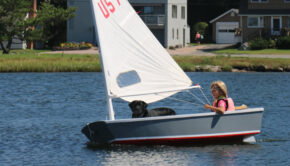Neutered? Never!
Published on July 16th, 2018
Why are boats referred to as ‘she’? Those of us with ink (or digital) ask these kinds of questions to properly phrase our sentence, but the absence of a definitive answer led one notable publication to tack. Chris Caswell’s 2009 column for Sailing magazine questioned the tactic.
It had to have been what journalists call “a slow news day” at Lloyd’s List which, having been founded back in 1734, is not only the British-based newspaper of the shipping industry but also the oldest publication in the world. I wasn’t there, of course, but I imagine it went something like this.
The editors were sitting around the newsroom, feet up on desks and cups of tea at hand. A cold March rain pattered on the windows and, with no ships sinking anywhere in the world, the staff was at loose ends. Julian Bray, the editor, was holding court on various and sundry seafaring topics when Freddy, a young associate editor, who had been shaving for a year and cut himself both times, brought up the question.
“Why do we have to refer to ships as ‘she’ in our stories,” he asked?
The silence as they say, was deafening. Bray sipped on his tea to stall while coming up with an answer, but it was still weak (the answer, not the tea). “Well, because…..” he said, his voice tapering off.
The younger editors, some of whom had actually been aboard a ship once at a dock, watched him as he squirmed for a better answer. “We’ve always done it,” he said, falling back on the easy out of 268 years of historical precedent. “Besides,” he said, sensing his responses were falling short, “the Royal Navy does it.”
Again, the silence was complete.
“Doesn’t it seem silly,” said another youngster, “to write about a ship named the Franklin Roosevelt and say that ‘she’ left the dock?”
It was clear which way the wind was blowing and the editor, in a moment of weakness, decided to bend with the breeze rather than be thought of as a stuffy leftover from another era.
“Fine,” he said decisively, “from now on all ships will be referred to as ‘it’ in our stories. Someone get out a press release to the industry.”
And so it came to be that on March 20 of this year, Lloyd’s List flew in the face of all tradition and precedent by announcing that ships were now “its” and not “shes.”
The teacups hadn’t been washed when the uproar began. Bray, recognizing quickly that he had set the wrong course, still strove mightily to defend his decision.
“Calling an elegant cruise liner ‘she’ is all very well,” he said, “but it could be offensive to apply the feminine pronoun to some rusting old hulk.”
Feeling that perhaps that didn’t completely quell the uprising, he stammered onwards with an addition that threw dynamite into an already raging fire. “We see it as a reflection of the modern business of shipping,” he told the London Financial Times. “Ultimately they are commodities, not things that have characters.”
Ah, Mr. Bray. How wrong you were. You thought you were being politically correct but you really had no idea that maritime traditions were so solidly anchored. The British Marine Federation, a group of yacht builders, snapped back that the Lloyd’s List decision was “an example of a creeping and unwelcome political correctness.”
When the first British America’s Cup yacht in 15 years was being christened days later, Princess Anne departed from her prepared script and, gesturing at the graceful 80-footer, went straight for Mr. Bray’s jugular. “I would like to thank the GBR Challenge team for asking me to perform the naming ceremony of ‘her’,” she said, with a heavy emphasis on the “her”. “The people at Lloyd’s have clearly never either launched or named a boat because it would be completely wrong to call her ‘it’.”
As the president of the Royal Yachting Association, she went on to note that some might regard the practice of calling boats “she” as sexist, particularly since they are often yelled at by their skippers, but she admitted doing the same to her horses, which made it okay.
Bray, from his rapidly dwindling supply of ammunition, fought back. “I decided it was time to catch up with the rest of the world, and most other news organizations refer to ships as neuter,” he said weakly, making it sound as though he had decided to spay the shipping world. He undermined his position somewhat when he added, “I don’t think there is anything wrong with calling ships ‘she’ in conversation.”
The esteemed Greenwich Maritime Museum of London, in the person of general editor Pieter van der Merwe, fired back, “It is a chip out of the wall of a particular cultural sector. You can say it’s a small thing, but small things mount up. You actually lose the color of specialist areas if you destroy the language of them,” he said pointedly, adding with haughty disdain, “We will continue to refer to ships as ‘she’ here.”
In passing, Bray had said that he expected a “full and vibrant array of letters” from the 10,000 readers of his newspaper, but the outcry has been avalanchean in proportion. Interestingly enough, not all of it has been in favor of hanging Mr. Bray from the nearest yardarm.
One newspaper noted that “The seagoing monsters of today have little of the character of the vessels of yesteryear. Today’s cruise ships and freighters look more like floating condominiums or warehouses than examples of naval architecture that embody both speed and grace. Calling one of those ships “it” seems entirely appropriate…”
An antisexism watchdog also chimed in to point out that the U.S. Navy, in all of its thousands of ships, has just one named for a woman. So why call the rest of them “she”?
An interesting point, but a spokesman for the Royal Navy, whose fleet includes both Penelope and Minerva not to mention the gender-specific HMS Battleaxe, added a nail to Mr. Bray’s coffin: “Lloyd’s List is at liberty to do what it likes, but the Navy intends to continue in a tradition that goes back centuries, if not millennia. It’s not just a sentimental thing but a part of culture. Everybody,” he said pointedly, “seems to think it’s a load of nonsense to change it.”
On this side of The Pond, there was no less outrage. Elizabeth Meyer, founder of the International Yacht Restoration School, called it “a laughable example of political correctness run amuck,” adding, “I think it’s dreadful.”
Lloyd’s List stuck by their guns, however, and, in April, the shipping world was neutered. The storm continues to rage, and I’m sure that Mr. Bray wishes that he could relive that rainy March afternoon.
I suspect he would have told Freddy not to be stupid and, by the way, where was the piece on coal bunkering that he was supposed to be writing?
Sorry, Mr. Bray. For me, boats will always be “shes”. Big or small, graceful or plain, they are all living creatures with beautiful souls.
Editor’s note: We took a look at Lloyd’s List and they continue their practice of remaining gender-neutral in their stories about ships.









 We’ll keep your information safe.
We’ll keep your information safe.